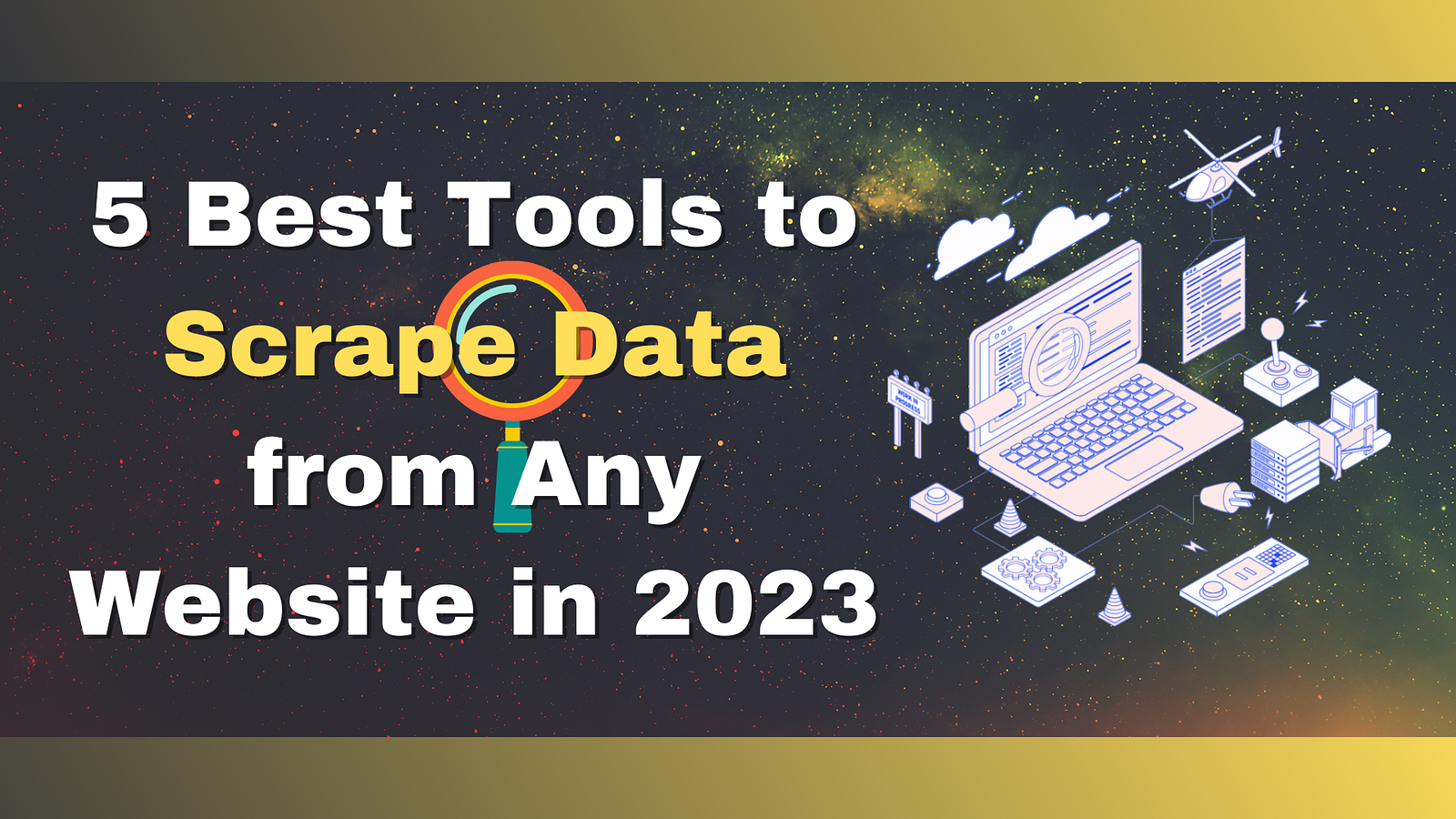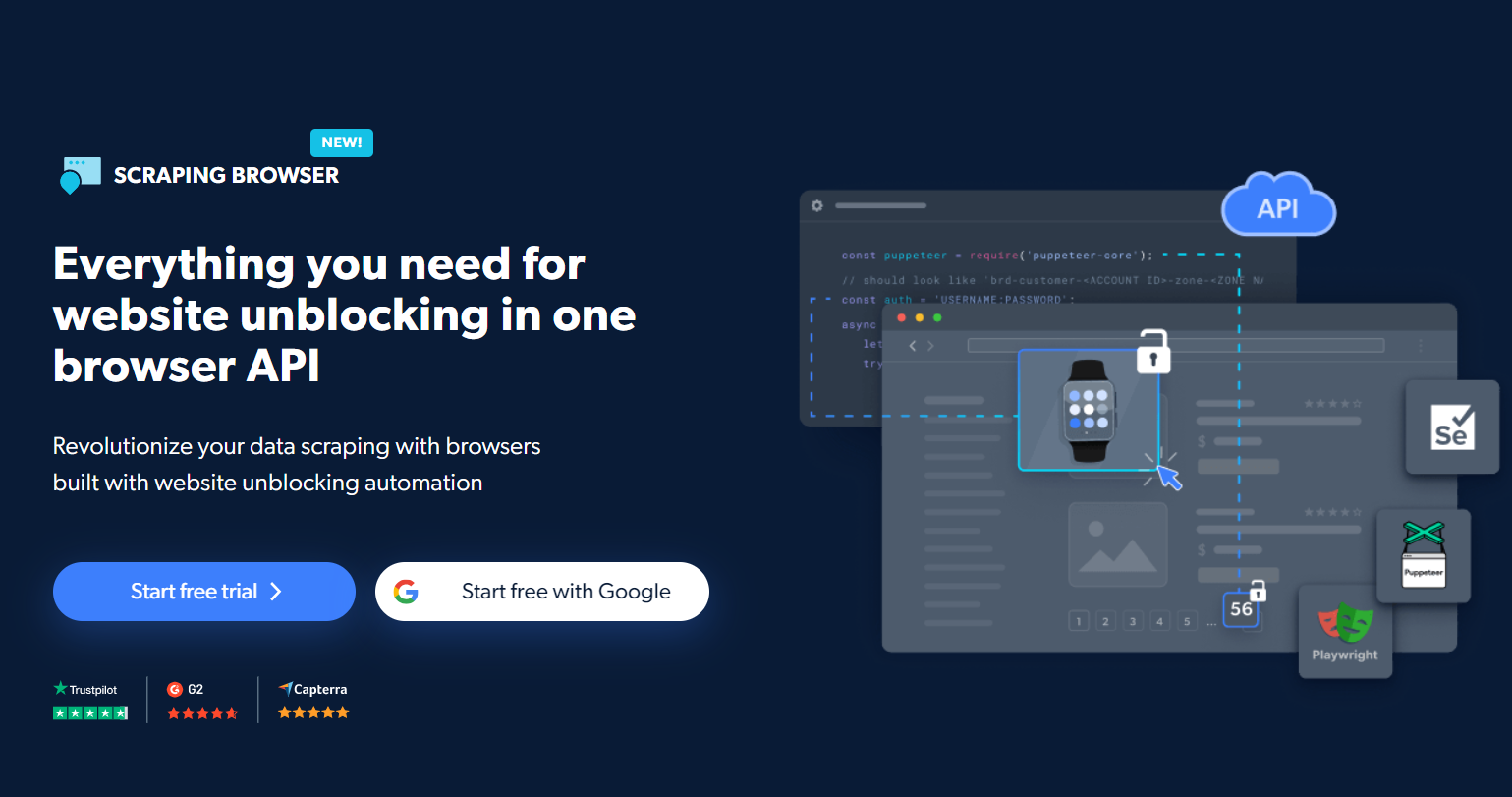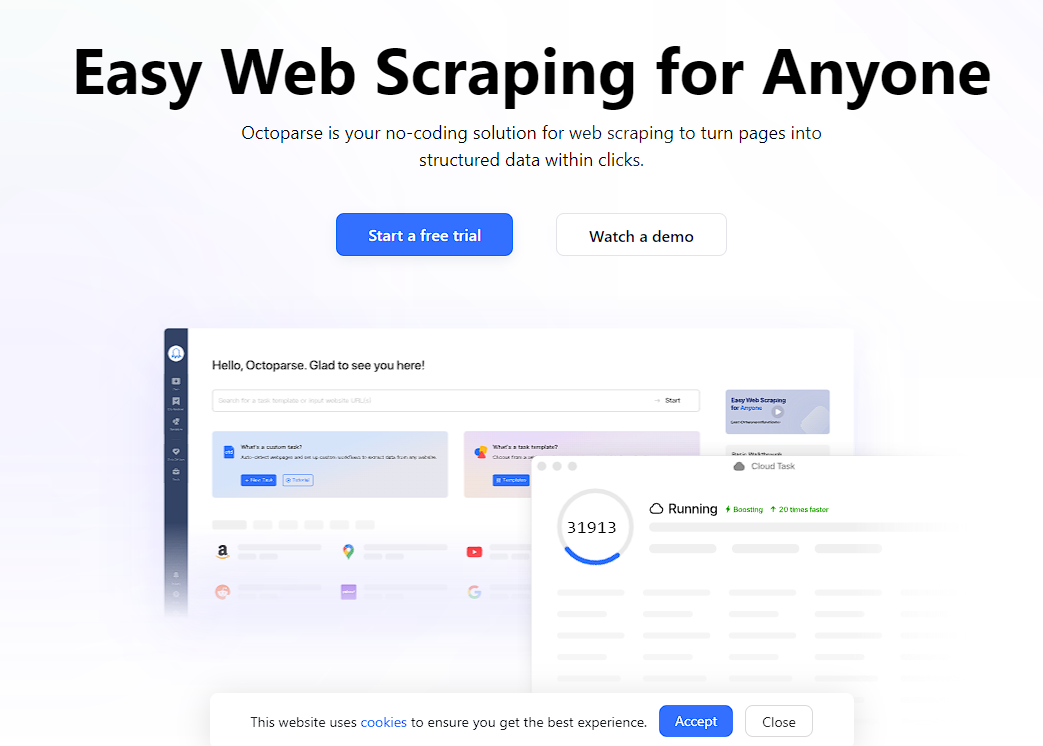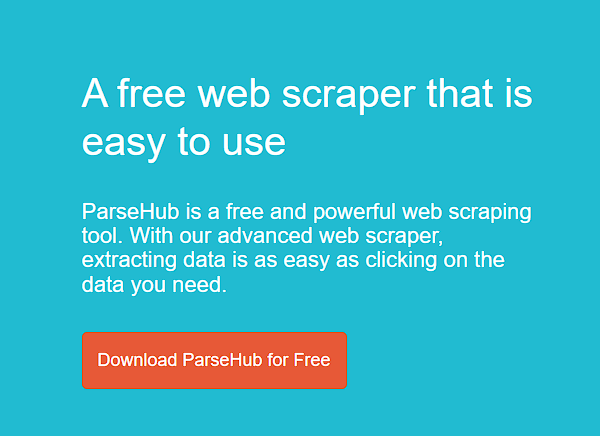
Data is integral to making decisions in all major industries like e-commerce, sports, tourism, etc. Now, the process of extracting data is complex and requires proper programming know-how, knowledge of relevant libraries, and expertise in handling several tools.
However, even with technical expertise, companies employing conventional methods of web scraping can run into a lot of roadblocks. Besides being a resource-intensive and time-consuming process, conventional web scraping methods can easily succumb to blocks (like CAPTCHAs, IP blocking, etc.) incorporated by site owners.
To overcome these shortcomings, there are a number of tools in the market that can be used. These tools come with certain features that give them an edge over conventional methods of web scraping.
Some of these features are:
- Web Crawling: This is the most obvious, the tool must be able to navigate through websites, follow links, and access various web pages to gather relevant data.
- Bypassing Blocks: A good data scraper should be able to bypass geo-location blocks, rate-limits, CAPTCHAs, and other website blocks that may interrupt the scraping process.
- Data Extraction: The tool has to be able to identify specific data elements based on user-defined criteria and extracts them from the web page's source code.
- Data Transformation: The extracted data often needs to be cleaned, structured, and formatted into a consistent layout suitable for analysis or storage.
- Scheduling and Automation: A good extractor should allow users to schedule scraping tasks to run at specific times or intervals, enabling regular data updates.
- Handling Dynamic Content: Advanced scraping tools should be capable of handling websites with dynamic content loaded using JavaScript or AJAX.
- Support for Various Data Formats: Extracted data can be saved in different formats, such as CSV, Excel, JSON, or even directly into databases.
- Customization: Users should have the option of configuring scraping rules, selecting which data to extract, and specifying how to navigate complex websites.
In this article, we've compiled the best data scraping tools that best meet the above criteria. These tools genuinely stand at the top of the heap and will meet all your data scraping needs, keeping you ahead of your competitors. Let's dive in.
1. Bright Data's Scraping Browser
The first tool on our list is Bright Data's Scraping Browser, which stands as a comprehensive, enterprise-grade solution that merges the advanced capabilities of a headful automated browser with the robust capabilities of Bright Data's unlocker infrastructure and proxy management services - all in a user-friendly package that you can seamlessly integrate with your existing headless Puppeteer/Playwright/Selenium workflows.
What makes the Scraping Browser unique is that the headful browser itself is a remote Chrome instance on Bright Data's servers, that you connect to over a WebSocket connection.
This affords you the possibility of scaling your scraping workload horizontally across multiple concurrent remote sessions - in the cloud, fully managed, with no infrastructure required on your part - making the Scraping Browser an excellent low-infra choice for scalable data extraction.
It also comes with a free trial so you can take it for a spin free of cost and experience its features for yourself.
👉To get started with the Scraping Browser, check out the official documentation
Key Features of Bright Data's Scraping Browser
- Dynamic scraping: Allows users to record browser network requests, set up a proxy, extract information from UI elements that load progressively, and many more advanced scraping techniques.
- In-built block-bypassing technology: Comes with an in-built unlocker infrastructure that can bypass even the most sophisticated anti-scraping blocks, taking care of everything from CAPTCHA-solving to user-agent generation, to cookie management and fingerprint emulation. The unlocker infrastructure is managed on Bright Data's end, meaning that it's constantly updated to bypass the latest blocking mechanisms implemented by websites. With this, you can eliminate the need for any manual coding to bypass blocks on your part or having to rely on third-party libraries.
💡 Pro Tip: One of the biggest problems with scraping data-rich websites today is that they use different techniques, ranging from IP blocks to CAPTCHAs, to block bots and crawlers. To ensure uninterrupted data collection at scale, it is vital to get around these blocks. Learn more about how the unlocker infrastructure enables this here.
- Premium proxy services: Gives you access to four kinds of proxy services - residential proxies, ISP proxies, data center proxies, and mobile proxies, making it easy to bypass IP blacklisting, geolocation blocks or rate limits. You can also automate IP rotation using a vast pool of more than 72 million authentic IP addresses, effectively making you immune to IP blacklisting. This dynamic process is designed to incorporate human-like intervals between requests originating from a single IP, bypassing most anti-bot detection mechanisms.
- Scalability: The Scraping Browser is able to scale horizontally by distributing the scraping workload across multiple servers and instances to ensure optimal performance and avoid bottlenecks - all without any infrastructure being required on your part.
- Ethical compliance: Bright Data's scraping browser and its associated proxy infrastructure adhere rigorously to data protection legislation, including the comprehensive EU data protection framework, GDPR, as well as the California Consumer Privacy Act of 2018 (CCPA).
Scraping Browser - Build Unblockable Scrapers with Puppeteer, Playwright and Selenium
*Augment your Puppeteer, Playwright and Selenium scrapers with a suite of unlocking tools: Proxy rotation and cooling...*brightdata.com
2. Octoparse
Next on our list is Octoparse, a no-code data scraper. Octoparse has a user-friendly interface that lets you gather information from various websites, including text, images, and structured data. Rather than relying on the popular route of using CSS and XPath selectors to build relationships between DOM elements, Octoparse uses Machine Learning to retrieve text from webpages, subsequently parsing and transforming it into organized data formats such as JSON, CSV, spreadsheets, or any preferred format.
Octoparse uses a point-and-click interface, and coupled with its pre-designed templates, removes the requirement for programming expertise. This makes the process of extracting, parsing, structuring, and exporting data, all achievable within a short time. It also has an AI assistant that gives you tips while scraping, so you'll never get lost.
Key Features of Octoparse
- Advanced Data Extraction: The tool provides options for extracting structured and unstructured data from websites, including tables, lists, images, and more.
- Visual Task Setup: Octoparse enables you to create scraping tasks by interacting with the website as if you are browsing it manually. This involves clicking on elements, inputting data, and navigating through pages.
- Scheduled Scraping: Users can set up automated scraping tasks to run at specific intervals, making it suitable for regularly updated data.
- Cloud Extraction: Octoparse offers a cloud-based service that allows users to execute scraping tasks on remote servers, which can be especially useful for larger tasks or when running tasks consistently.
- IP rotation: Enabling automatic IP rotation ensures genuinely anonymous scraping, safeguarding against tracking, crawler detection, and potential blocking.
3. Apify
Next on our list is Apify, a platform, and toolkit that simplifies the process of web scraping, data extraction, and automation. It provides a set of tools, libraries, and resources for developers to build, manage, and deploy web scraping and automation tasks without needing to handle complex infrastructure or manage servers.
Rather than relying solely on a pre-built interface, Apify allows you to write your own code using well-known open-source libraries like Scrapy, Selenium, Playwright, Puppeteer, or Apify's proprietary Crawlee. After developing your code, you can deploy it on Apify's cloud infrastructure and set up scheduling to execute it according to your requirements, making the scraping process quite simple.
Key Features of Apify
- Powerful proxies: Apify Proxy allows you to modify your IP address while scraping data, effectively lowering the risk of encountering blocks due to your geographical location. This feature helps enhance anonymity and reduces the likelihood of websites detecting and restricting your scraping activities based on IP-related factors.
- Storage system: Apify offers a comprehensive storage system that enables you to amass scraped data in diverse formats, including JSON, CSV, and XML files. It also allows you to store a wide range of data types, including images, key-value pairs, and structured output data. This versatility in storage capabilities enables you to efficiently manage and retain various types of information collected during your scraping and automation processes.
- Actors: Actors are customizable scripts or programs that automate specific tasks on the web. Apify provides a marketplace of pre-built actors for various use cases, such as scraping data from e-commerce sites, social media, news sources, and more.
- Task Scheduler: With Apify, users can schedule their scraping tasks to run at specific intervals, ensuring regular updates of the extracted data.
4. ParseHub
ParseHub is one of the most user-friendly data scrapers in the market today. It allows access to data scraping from both static and dynamic sites and uses a point-and-click interface, so unlike some other data scrapers, you don't need any coding skills to use this data scraper.
To use it, you simply have to download their desktop app, choose a website to extract data from, interact with the page and select the data you want to extract, and it'll be extracted by ParseHub's servers, and accessible as downloadable JSON or Excel sheets, or via their REST-based API.
Because ParseHub is designed to be lightweight and easy to use, it's not as equipped to avoid website blocks as some of the other tools on this list. However, it still supports IP Rotation, Geolocating, CAPTCHA solving, and Javascript Rendering so if you choose this tool, you'll still have some weapons in your arsenal to tackle common anti-scraping measures.
Key Features of ParseHub
- Visual Data Extraction: ParseHub, like Octoparse, employs a point-and-click interface, enabling users to visually select elements on a webpage for data extraction. This eliminates the need for manual coding.
- Cloud-based Storage: ParseHub uses cloud storage to automatically store and manage all of the extracted data.
- API-based Data Extraction: ParseHub offers an API that streamlines the data scraping workflow. With each request directed to the ParseHub server, users can access the most current data, guaranteeing its freshness and accuracy. The API can also be integrated with other applications and services, optimizing operational efficiency to the fullest extent.
- Support and Community: The tool has great documentation, tutorials, and an impressive community forum for users to seek assistance and share knowledge.
5. ScrapingBee
The last tool on our list is ScrapingBee. ScrapingBee is a data-extraction API that presents a dependable option for developers in search of a streamlined approach to extracting data from websites, eliminating the need to construct a scraper from the ground up. ScrapingBee also offers no-code solutions to people with little to zero dev knowledge, making it accessible to all.
ScrapingBee is particularly great for Growth hacking (lead generation, extracting contact information, or social media), but it's also useful for getting other kinds of data from e-commerce sites due to its CAPTCHA handling, automated proxy rotation to bypass rate limiting, and pagination support. And it even comes with a scraping scheduler.
Key Features of ScrapingBee
- Offers both SDK and API-based solutions: ScrapingBee offers SDKs for Node.js and Python that handle headless browsers and automatically rotate proxies for you. The SDK is an easier way to interact with ScrapingBee's API, mimicking human interaction and ensuring that dynamic content, JavaScript-rendered pages, and user interactions are handled correctly.
- Geotargeting with Proxies: ScrapingBee offers automated proxy rotation and premium proxies that can be used to geotarget any country for finer-grained data collection.
- Flexible delivery: The API supports data extraction and delivery in various formats, such as screenshots, JSON, Google Sheets, Email delivery, CSV, or via webhooks - all with customizable extraction rules. This flexibility allows users to receive data in a format that best suits their analysis or integration needs.
- No Code Option: ScrapingBee provides a Make integration to create custom scraping engines without writing any code at all.
- Extensive documentation: Code examples in JavaScript, Python, Go, PHP, Java, or just cURL, along with a large knowledge base and live support.
Conclusion
There are many different data scrapers in the market, some are free, some are paid, some give no-code solutions, and some require a little bit of coding experience. The options are vast, but we've been able to help you narrow them down to the above five tools because they stand head and shoulders above all other data scrapers.
Which of the above five is the best data scraper though? Well, that depends on your data scraping needs and skill level. The Scraping Browser is your go-to if you want to avoid all kinds of anti-scraping measures and still easily get all kinds of data, Octoparse] is the best bet if you have zero programming skills, and Apify has a vast marketplace with actors dedicated to different websites.
If you can afford to try them all, feel free to do that in your own time. However, you'll be hard-pressed to find better web scraping solutions than the above five tools anywhere in the market in 2023.




